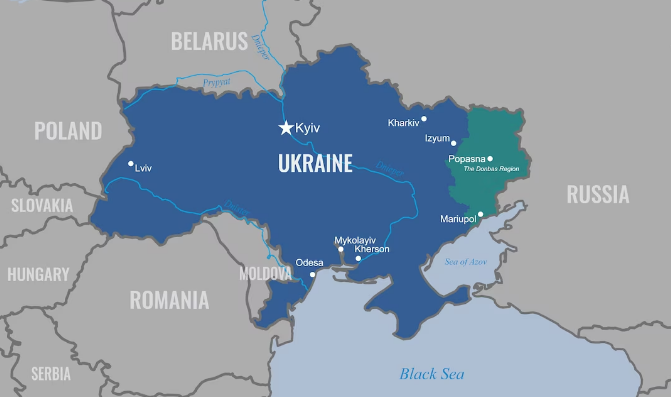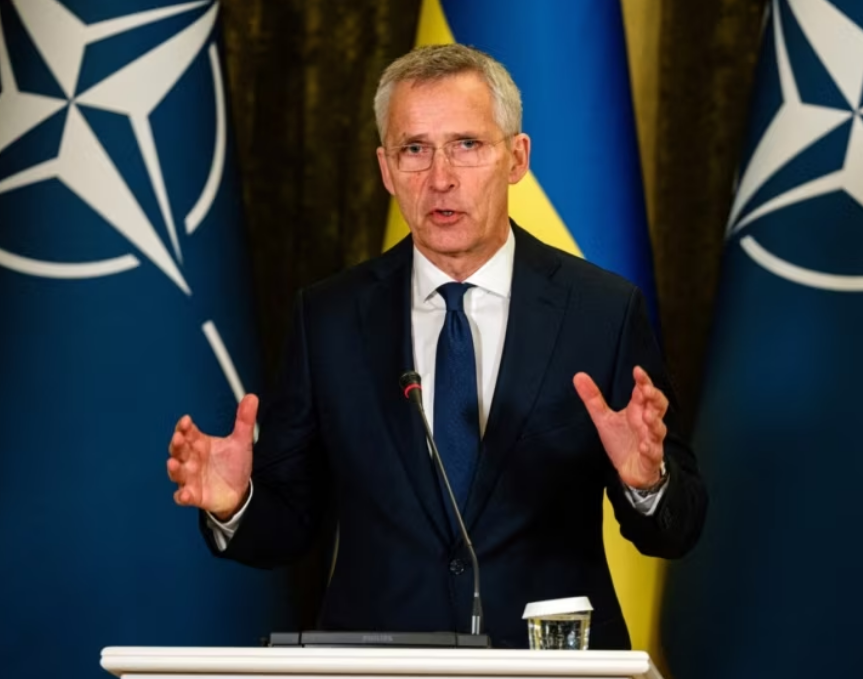November 10, 2023
 Image: Map of Ukraine area and surrounding countries.
Image: Map of Ukraine area and surrounding countries.
As the conflict in Ukraine rages on, the northern town of Bakhmut has come under heavy shelling, causing further distress and uncertainty for its residents. Simultaneously, NATO's Secretary-General, Jens Stoltenberg, delivered a grim assessment of the situation, stating that there is "no sign" that Russian President Vladimir Putin is preparing for peace. This article delves into the latest developments in the Ukraine war, focusing on the intense shelling in Bakhmut and the NATO chief's sobering remarks.
The Ukraine war has seen its share of violence, but the recent heavy shelling in Bakhmut has escalated tensions in the region. The town, located in northern Ukraine, has become a focal point in the ongoing conflict. While the head of Russia's Wagner Group claimed to have taken control of the village of Krasna Hora on Bakhmut's northern edge, the situation remains unverified. The heavy shelling in Bakhmut has raised significant concerns about the safety of civilians and the potential for further escalation. Images and reports from the area depict the devastating impact of the shelling, highlighting the urgent need for humanitarian aid and a peaceful resolution to the conflict.
 Image: NATO Secretary-General Jens Stoltenberg
Image: NATO Secretary-General Jens Stoltenberg
NATO, the North Atlantic Treaty Organization, plays a crucial role in monitoring the developments of the Ukraine war and the actions of Russia. Jens Stoltenberg, NATO's Secretary-General, recently provided a sobering assessment of the situation, indicating that there is "no sign" that Russian President Vladimir Putin is preparing for peace.
This assessment serves as a stark reminder of the gravity of the situation in Ukraine and the challenges facing diplomatic efforts to end the conflict. To understand the implications of this assessment and the broader context, let's explore the key factors contributing to the ongoing Ukraine war and its impact on international relations.
The conflict in Ukraine is multifaceted, with historical, political, and geopolitical elements at play. The war erupted in February last year, and its roots can be traced back to Ukraine's desire for closer ties with the European Union and the subsequent annexation of Crimea by Russia in 2014. The conflict has evolved into a protracted war, with Ukrainian government forces fighting against separatist groups in Eastern Ukraine, primarily in the Donetsk and Luhansk regions.
A significant part of the conflict revolves around the control of territory in Eastern Ukraine. Pro-Russian separatist groups, with alleged support from Moscow, have declared independent republics in Donetsk and Luhansk, further complicating the situation.
The conflict has resulted in a severe humanitarian crisis, with thousands of casualties, both military and civilian. Millions have been displaced from their homes, and essential services, such as healthcare and education, have been disrupted.
The Ukraine war has strained relations between Russia and Western countries, including the United States and its NATO allies. Economic sanctions and political isolation have been used as tools to pressure Russia to seek a peaceful resolution.
Several ceasefire agreements, most notably the Minsk agreements, have been brokered to bring an end to the fighting. However, these ceasefires have repeatedly broken down, with both sides accusing each other of violating the terms.
NATO, an intergovernmental military alliance that includes many Western countries, has been closely monitoring the Ukraine conflict. Its role is vital in assessing the situation, providing support to Ukraine, and offering a unified response to the crisis.
Jens Stoltenberg, as the Secretary-General of NATO, has been a prominent figure in articulating the alliance's stance on the Ukraine war. His recent statement that there is "no sign" that Putin is preparing for peace indicates a deep concern within NATO about the conflict's ongoing nature and the intentions of the Russian government.
The recent heavy shelling in Bakhmut has drawn international attention to the suffering and uncertainty faced by the town's residents. Bakhmut is strategically located in the northern part of the Donetsk region, making it a significant point of interest for both Ukrainian government forces and separatist groups.
The heavy shelling has caused significant casualties among the civilian population and has led to a severe humanitarian crisis. Thousands of residents have been forced to flee their homes, seeking safety and shelter in neighboring areas.
The shelling has disrupted essential services, including healthcare and education. Hospitals and schools have been damaged or rendered inoperative, leaving the population vulnerable and children deprived of their right to education.
The constant threat of shelling and violence has taken a toll on the psychological well-being of Bakhmut's residents, particularly the children who have grown up amidst the conflict.
The heavy shelling has left the population of Bakhmut in a state of uncertainty about their future. With the conflict showing no signs of abating, there is a growing sense of despair among the people.
Jens Stoltenberg's recent assessment that there is "no sign" Putin is preparing for peace underscores the ongoing challenges in resolving the Ukraine conflict. This statement reflects NATO's concerns about the lack of progress in diplomatic negotiations and the potential for further escalations.
The assessment highlights the diplomatic stalemate in efforts to bring about a peaceful resolution to the Ukraine war. Despite numerous negotiations and ceasefire agreements, the conflict persists.
Stoltenberg's remark about Putin's intentions underscores the skepticism within NATO regarding Russia's commitment to a peaceful settlement. The assessment implies that Russia may continue its aggressive posture in the region.
The absence of signs of peace preparation also raises concerns about the possibility of further escalation in the conflict. This escalation could have broader regional and global implications.
The assessment acknowledges the significant humanitarian consequences of the conflict, including the suffering of civilians, displacement, and damage to essential infrastructure.
The situation in Ukraine remains deeply complex and presents a formidable challenge to the international community. As Bakhmut comes under heavy shelling, and NATO expresses concerns about the prospects for peace, several critical steps can be taken to address the crisis:
Diplomatic negotiations must continue with renewed vigor. All parties involved, including Ukraine, Russia, and international mediators, must recommit to finding a peaceful solution through dialogue.
Immediate humanitarian aid is essential to alleviate the suffering of civilians affected by the conflict. The international community must step up its efforts to provide assistance, including medical care, shelter, and food.
Efforts to enforce ceasefire agreements and prevent further escalation must be a top priority. International observers and peacekeeping missions can play a pivotal role in ensuring compliance.
The international community, led by organizations like the United Nations and NATO, should continue to exert diplomatic pressure on all parties involved, emphasizing the need for peace and stability in the region.
Track II diplomacy, which involves non-governmental organizations, academic institutions, and civil society, can facilitate dialogue between conflicting parties and build confidence for negotiations.
The heavy shelling in Bakhmut serves as a grim reminder of the ongoing suffering of civilians in the Ukraine war, while NATO's sobering assessment underlines the complexities and challenges of achieving a peaceful resolution. The international community must redouble its efforts to bring about an end to the conflict, mitigate the humanitarian crisis, and ensure the well-being of the people affected by this protracted war. As the situation continues to evolve, the world watches closely, hoping for a breakthrough that can bring lasting peace to Ukraine.
Author Jimmy Wolf - Inspirernews.com
Reference: Aljazeera